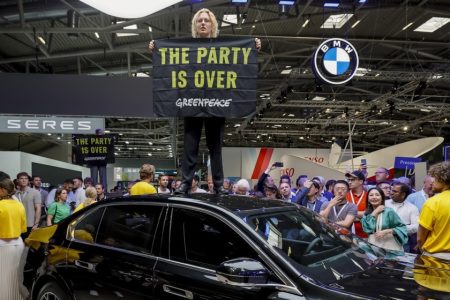
[[{“value”:”
German conservative parties CDU and CSU have launched a campaign against the 2035 de-facto ban of new combustion engine cars, an issue the party says is critical for the June EU elections.
The EU adopted rules in 2023 that will ban the sale of new petrol and diesel cars as of 2035, by reducing allowed tailpipe emissions to zero in updated CO2 standards for cars.
“For us, the European elections are also a vote on the future of the combustion engine,” CDU lawmaker Christoph Ploß told Focus Online.
On Friday (24 May), the party launched a website called ‘Yes to the car’, where users can indicate whether they support revising the 2035 deadline for the sale of new petrol or diesel cars. Germany’s car industry – the strongest in Europe – is one of the backbones of its economy.
In its election manifesto, the party already committed to reversing the policy, a call which was however not included in the EU-level manifesto of the European People’s Party.
“The climate targets can also be achieved very well with the combustion engine,” Ploß said, “for example by using climate-friendly fuels, be it biofuels, synthetic diesel fuels such as the biogenic HVO100 that is already available, or e-fuels produced on the basis of green electricity.”
While synthetic diesel based a 100% on Hydrotreated Vegetable Oil (HVO) can be sold at German pump stations as of April 2024, critics note the limited availability of the biological waste and residues needed to produce the alternative fuel.
“A fuel for which used frying fat from Asia is transported halfway around the world to be burnt here in car combustion engines is not sustainable,” Jürgen Resch, director of environmental NGO Deutsche Umwelthilfe said when the fuel was authorised last month.
E-fuels are synthetic fuels produced with CO2 taken from the atmosphere or from industrial sites such as cement plants. Such fuels could offer a solution at larger scale, and higher prices. However they are not yet available on the market.
When the new EU-level CO2 standards were adopted, Germany’s liberal Transport Minister Volker Wissing insisted on an exception for cars running on e-fuels, which should continue to be allowed for sale even after 2035.
“The FDP has bitterly disappointed everyone who is in favour of the combustion engine and technological openness,” Ploß said, adding that the agreement struck between Wissing and the EU Commission on ‘e-fuel-only’ cars was “not worth the paper it is printed on”.
While the exemption has not yet been implemented due to an unresolved dispute on whether eligible e-fuels should be 100% climate neutral, Wissing voiced optimism earlier this week that the issue could be resolved.
“I am convinced that it will also make an important contribution to achieving the difficult balancing act of keeping as many people as possible mobile and protecting our climate at the same time,” he told an international conference of transport ministers in Leipzig on Wednesday (22 May).
[Edited by Donagh Cagney/Zoran Radosavljevic]
Read more with Euractiv
“}]]






